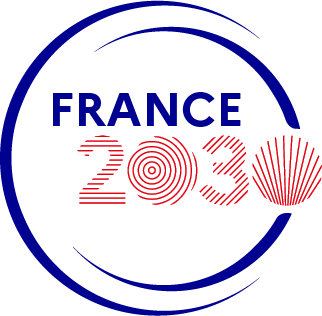-
PARAFRAP
- Qui sommes-nous
- Objectifs du Labex
- Laboratoires de recherches
- Coordinateurs
- Collaborateurs industriels
- Tutelles et soutiens
- GOUVERNANCE
- Organisation
- Comité de pilotage
- Comité exécutif
- Conseil scientifique international
- Comité Institutionnel
- FORMATION
- CONFERENCES
- THÉMATIQUES
- Exploitation des données post génomiques
- Mécanisme de la pathogénie
- Biologie Cellulaire et Moléculaire
- Nouvelles stratégies d'interventions thérapeutiques
- Plateformes
- VALORISATION
-
PARAFRAP
- Qui sommes-nous
- Objectifs du Labex
- Laboratoires de recherches
- Coordinateurs
- Collaborateurs industriels
- Tutelles et soutiens
- GOUVERNANCE
- Organisation
- Comité de pilotage
- Comité exécutif
- Conseil scientifique international
- Comité Institutionnel
- FORMATION

Marie-France
CESBRON-DELAUWInformation

TIMC UMR 5525 CNRS-Université Grenoble-Alpes 
BNI - Barrières Naturelles et Infectiosité 
Grenoble 
0000-0002-5423-4094 
Cette adresse e-mail est protégée contre les robots spammeurs. Vous devez activer le JavaScript pour la visualiser. 
https://www-timc.imag.fr/en/bni Scientific interests and projects
The BNI team is interested in the innate control of Toxoplasma gondii infectivity.
Infectivity refers to the capacity of a parasite to infect an individual. It involves pathogenrecognition systems, and the diversification of responses relies on the combined genetic diversity of both host and pathogen. We have established that in the rat model the control of Toxoplasma infectivity is genetically controlled by Toxo1, a single locus located on the rat chromosome 10. In resistant rats, the parasite elimination occurs at the site of infection (intestinal barrier) and involves the rapid killing of infected resident macrophages which in turn contributes to the lack of parasite dissemination. In vitro, infected resistant rat macrophages trigger the NOD-like receptor NLRP1a/Caspase-1 pathway to induce the death of both parasites and their hosting macrophages. This is parasite-induced and differs among T. gondii genotypes. Thus, having demonstrated that the parasite fate depends on both the Toxo1 locus genotype (LEW or BN origin) and the parasite genotype, we are interested in the characterization of factor(s) and pathway(s) which activate the Toxo1- dependent resistance to toxoplasmosis.
Our ongoing strategy is based on global comparative analyses of -i) resistant vs susceptible macrophages functions before and following parasite infection and -ii) a set of parasite mutant vs wildtype capable to bypass the resistance. Bioinformatics analysis will combine results from comparative proteomics, transcriptomics and metabolics. Candidate signaling/metabolic host pathway(s) and gene(s) will be validated using classical reverse genetics, biochemical and cellular studies
Top 5 publications of the last 5 years
1. Cavailles P, Flori P, Papapietro O, Bisanz C, Massera C, Cristinelli S, Jublot D, Bastien O, Loeuillet C, Aldebert D, Touquet Lagrange D, Pilloux Ludovic, B, Fournié GJ and MF Cesbron-Delauw (2014) A highly conserved Toxo1 haplotype directs resistance to toxoplasmosis and its associated caspase-1 dependent killing of parasite and host macrophage. PLoS Path. 10(4), e1004005. doi: 10.1371/journal.ppat.1004005
2. Mercier C and MF Cesbron-Delauw (2015) Toxoplasma secretory granules: one population or more? Trends Parasitol. 31: 60-71. doi: 10.1016/j.pt.2014.12.002
3. Lopez J., Bittame A, Massera C, Vasseur V, Effantin G, Valat A, Buaillon C, Allart S, Fox BA, Rommereim LM, Bzik DJ, Schoen G, Weissenhorn W, Dubremetz JF, Gagnon J, Mercier C, Cesbron-Delauw MF and N Blanchard (2015) Intravacuolar membranes regulate CD8 T cell recognition of membrane-bound Toxoplasma gondii protective antigen. Cell Reports 13: 2273-2286. doi: 10.1016/j.celrep.2015.11.001
4. Touquet B, Pellissier E, Cavailles P, Yi W, Bellini V, Mercier M, Cesbron-Delauw MF, Boumendjel A and D Aldebert (2018) High-content imaging assay to evaluate Toxoplasma gondii infection and proliferation: a multiparametric assay to screen new compounds. PLoS One 13(8):e0201678. doi: https://doi.org/10.1371/journal.pone.0201678.
5. Loeuillet C., Mondon A., Kamche S., Curri V., Boutonnat J., Cavaillès P. and MF Cesbron- Delauw (2019). Toxoplasma hypervirulence in the rat model parallels human infection and is modulated by the Toxo1 locus. Front. Cell. Infection Microbiol. 9 :13 doi: 10.3389/fcimb.2019.00134
lundi 9 février 2026INSERM Workshop: Modern Methods in Molecular Parasitology (Montpellier, 4–6 November 2026)
The INSERM workshop “Modern methods in molecular parasitology” will take place in Montpellier, France, from 4–6 November 2026. This event will bring together leading experts in...
lundi 9 février 202615th CAPF (the French Anti-Parasitic and Anti-Fungal Consortium) workshop , March 16-17, 2026
The 15th CAPF (French Anti-Parasitic and Anti-Fungal Consortium) workshop will take place on 16–17 March 2026 in Strasbourg (France). This event is an excellent opportunity for students and postdoctoral researchers to participate and contribute...
mardi 20 janvier 2026Call for Applications: New Junior Research Groups at Institut Pasteur
Call for Applications: New Junior Research Groups at Institut Pasteur The Institut Pasteur has launched an international call to recruit new junior group leaders.This is a unique opportunity for high-potential scientists to...
lundi 12 janvier 2026Ingénieur·e d’étude / Research Engineer – Mosquito Immunity (IBMC, Strasbourg)
JOB : Ingénieur·e d’étude / Research Engineer – Mosquito Immunity (IBMC, Strasbourg) 🇫🇷 Le laboratoire Mosquito Immune Responses recrute un·e ingénieur·e d’étude à l’IBMC (Strasbourg). La personne recrutée sera en...
mardi 6 janvier 2026Applications Open for the Biology of Parasitism Course 2026
Applications are now open for the 2026 Biology of Parasitism (BoP) course, taking place June 12–July 23, 2026 at the Marine Biological Laboratory in Woods Hole, MA.This intensive 6-week program offers PhD students and postdocs advanced training in...
jeudi 27 novembre 2025Research Assistant/Associate Position | Molecular Parasitology | Newcastle University
Newcastle University offers a full-time, fixed-term position (3 years) for a Research Assistant or Research Associate in Molecular Parasitology — funded by the Medical Research Council (MRC). About the Opportunity Location:...
jeudi 13 novembre 2025PhD Opportunity | African Trypanosomes | University of York
Multidisciplinary PhD opportunity in the fields of infectious diseases, gene regulations and molecular signalisation. Fully Funded 4-Year PhD at the University of York A fully funded PhD opportunity is available at the...
mardi 14 octobre 2025Recap of the EMBO Workshop 2025
The EMBO Workshop 2025 “Host–Parasite Relationship: From Mechanisms to Control Strategies”, took place from October 5–8, 2025, on the beautiful Île des Embiez (France). Organized within the framework of the LabEx ParaFrap and...
jeudi 31 juillet 2025PostDoc l Toxoplasma l Montpellier, FR
Postdoc (M/F) in molecular and biochemical parasitology (Toxoplasma gondii) A 24-month post-doctoral position starting on January 2026 and funded by the French National Research Agency (ANR) is available in the in the...
lundi 9 juin 2025PostDoc l Trypanosoma l Bordeaux, FR
Postdoc (M/F) Molecular and cell biology in Trypanosoma brucei A 24-month post-doctoral position starting on November 1st 2025 (or before) and funded by the French National Research Agency (ANR) is available in the...
Bluesky feed
PROGRAMME DE FORMATION FR
Programme Doctoral InternationalProgramme Post-doctoralACTUALITÉS
© 2023. Tous droits réservés by MLCOM
Notre site LabEx ParaFrap utilise des cookies pour réaliser des statistiques de visites, partager des contenus sur les réseaux sociaux et améliorer votre expérience. En refusant les cookies, certains services seront amenés à ne pas fonctionner correctement. Nous conservons votre choix pendant 30 jours. Vous pouvez changer d'avis en cliquant sur le bouton 'Cookies' en bas à gauche de chaque page de notre site. En savoir plus
Paramétrages de cookies
×Cookies fonctionnels
Ce site utilise des cookies pour assurer son bon fonctionnement et ne peuvent pas être désactivés de nos systèmes. Nous ne les utilisons pas à des fins publicitaires. Si ces cookies sont bloqués, certaines parties du site ne pourront pas fonctionner.
Mesure d'audience
Ce site utilise des cookies de mesure et d’analyse d’audience, tels que Google Analytics et Google Ads, afin d’évaluer et d’améliorer notre site internet.
- Google Analytics
- Google Ads
Contenus interactifs
Ce site utilise des composants tiers, tels que NotAllowedScript69932eeb85383ReCAPTCHA, Google NotAllowedScript69932eeb84fe8Maps, MailChimp ou Calameo, qui peuvent déposer des cookies sur votre machine. Si vous décider de bloquer un composant, le contenu ne s’affichera pas
- Google Maps
Pour en savoir plus, cliquez sur le lien.
Voir le site officiel - Calameo
Pour en savoir plus, cliquez sur le lien.
Voir le site officiel - reCaptcha V2
Pour en savoir plus, cliquez sur le lien.
Voir le site officiel - reCaptcha V3
Pour en savoir plus, cliquez sur le lien.
Voir le site officiel
Réseaux sociaux/Vidéos
Des plug-ins de réseaux sociaux et de vidéos, qui exploitent des cookies, sont présents sur ce site web. Ils permettent d’améliorer la convivialité et la promotion du site grâce à différentes interactions sociales.
- Twitter
Pour en savoir plus, cliquez sur le lien.
Voir le site officiel
Session
Veuillez vous connecter pour voir vos activités!Autres cookies
Ce site web utilise un certain nombre de cookies pour gérer, par exemple, les sessions utilisateurs.




